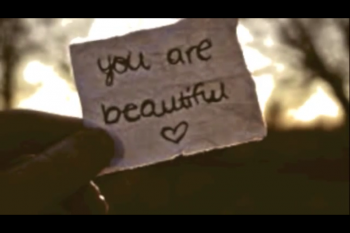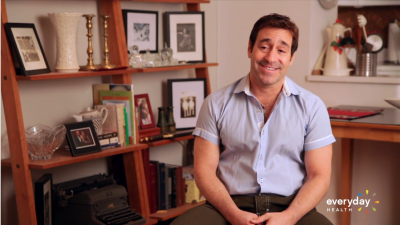The world of HIV/AIDS is changing for the better. The amount of new HIV infections worldwide has dropped more than 50%, according to the World AIDS Day report. Yet there are there still so many people having unsafe sex and getting infected with HIV. This podcast explores the contradiction of human behavior in this new age of AIDS and tries to offer a solution. Giving a voice to the mothers who lost their sons to AIDS a generation ago, imagine what they might say to today’s young men and women putting themselves at risk for HIV. Recorded in front of a live audience at Congregation Beth Simchat Torah, NYC for World AIDS Day Shabbat. Tissues recommended.

I did an interview with A&U magazine recently about truth, lies, and my work.
Take a look here – http://aumag.org/wordpress/2014/07/14/scott-fried/
In the early ’80s, HIV/AIDS was a seen as a disease of risk groups. Three decades later, we know it is a disease of risk behavior. But more than a disease, AIDS can also be seen as a metaphor that reminds us to love one another, to offer kindness and to learn about life. This short podcast delves into the question of what it’s like to live with HIV and the blessings that it can bring.

A quick reminder that my t-shirt design contest is still on! I’m taking submissions through the end of the month. Have you submitted your design yet?
The design above by Rebecca Schneider is the current leader.
And don’t forget to vote on your favorite design here.

Name:
Hannah
Age:
14
Who Are You?
I am not who I want to be.
Whose arms do you fall into?
Friends and Family.
What is the one miracle you are waiting for?
I want something to happen in my life. Life is so boring.
What is your weapon?
Music.
Whom do you miss the most?
My little-kid self.
What are you scared of?
The dark. Losing people I love. Rejection.
What is your favorite memory?
Going to Disney World with my family.
When was the last time God spoke to you and what did He say?
I don’t know.
What words are you holding onto in your pockets?
Many. So many. People have always trusted me with their secrets. I don’t want them.
What’s the best advice you’ve ever been given?
Be yourself.
What advice would you give to your parents that will help them in raising you?
Don’t change.
Is there sometimes an emptiness inside you and what does it feel like?
It feels like I’m about to explode.
Are you enough?
No. No one is ever enough, at least not to themselves.

Pubic lice are tiny insects that can crawl from the pubic hair of one person to the pubic hair of another person during sexual contact. People can also catch pubic lice from infested clothing, towels and bedding. Once they are on a person’s body, the insects live by sucking blood from their host. Pubic lice are sometimes called “crabs” because when seen under a microscope they look like tiny crabs. They are the size of a pinhead when fully grown.
They are found in pubic hair around the scrotum, anus, vagina and penis. But they can also be found anywhere you have body hair. This includes the hair of the beard, moustache, eyelashes, eyebrows armpits, and sometimes the chest and abdomen, but not in hair on the head.
Crabs feed on blood, but they cannot pass on HIV. The lice can live away from the body for 24 hours so they could survive that long on clothes, bedding and towels.
Someone who has been exposed to pubic lice may not notice symptoms for 2-3 weeks but those symptoms include:
- Intense itching in genital areas or anus, especially at night. This is caused by an allergic reaction. When a lice bites the skin to feed on a person’s blood, their saliva from these bites causes this result.
- Inflammation and irritation in the infected areas, due to scratching.
- A skin reaction that is bluish-grey in color, from the bitesThese will be small, flat marks (maculae cerulea) that look like bruises. These can still exist months after the lice have been killed.
- Lesions (sores) in the genital area, due to bites and scratching.
- Black “powder” in your underwear. (Excrement from the lice.)
If you’ve been exposed to pubic lice, you may notice tiny tan to grayish-white insects crawling in the pubic hair. Lice are visible to the naked eye using a strong light. They look pale gray in color; they darken when swollen with blood. You may also see tiny oval-shaped, yellow to white blobs called nits clinging to the hair. Nits are about the size of a pinhead, and are the louse eggs. Nits can’t be easily removed from the hair with the fingers — “nit combs” made especially to remove the eggs are sold at drugstores and many grocery stores.
It’s unusual for pubic lice to create any serious health problems, but the itching can be very uncomfortable, and it’s easy to transmit pubic lice to others. The female louse survives an average of 25 to 30 days and each can lay 20 to 30 eggs. Lice can also live away from the body for 1 to 2 days. So it’s important to get properly diagnosed and treated, or it can take a while to get rid of them.
If a case of Public Lice is left untreated, it can lead to severely infected skin. When you scratch, you break skin, and that broken skin can be infected by bacteria, particularly that found in the refuse of the Pubic Lice themselves.
Additionally, you may also experience matted and foul-smelling pubic hair and infected blisters in the pubic area.
Interesting fact: if you have Pubic Lice and shave off your pubic hair, the lice will simply relocate to another areas of the body that Pubic Lice infest. If your personal desire is to shave the area, you could keep a closer watch on the success of your Rx. However, if you don’t plan to keep the area shaved then it’s a lot of needless effort that won’t help you heal faster.
If you think you may have pubic lice or if you have had a partner who may have pubic lice, see a doctor or gynecologist right away. If the doctor diagnoses pubic Lice, you may be prescribed medication or told to buy an over-the-counter medicine that kills the lice and their eggs.
There are over the counter drugs such as RID, A-200 and InnoGel, will that eliminate lice. Put the lotion all over your body and leave it on for 24 hours.
Topical creams or lotions containing permethrin (for example, Lyclear cream or Quellada lotion) and applied to the affected area are the most commonly recommended treatment.
However, Permethrin should not be applied to the eyelashes. If this area is affected, discuss an alternative treatment such as petroleum jelly.
Water-based treatments are also available for those with allergies and sensitive-skin.
Pubic lice can sometimes develop resistance to certain treatments. Your doctor or pharmacist can advise you on suitable alternatives if this occurs.
The important thing to remember is that the treatment you use may need to be repeated after 7 to 10 days to kill any lice you didn’t get the first time. And anyone who is treated for Pubic Lice should be tested for other STIs as well.
You will also need to dry clean or use very hot water and a hot dryer cycle to wash and dry all your bedding, towels or recently worn clothing to properly kill the lice and their eggs. Don’t forget about your luggage!
Anyone with whom you’ve had sexual contact in the last month should also check for Pubic Lice immediately.
Although condoms help protect against other STIs, a partner could still get Pubic Lice because the condom does not cover the entire pubic area.
Treatment for public Lice will be much more effective if few simple guidelines are consistently followed:
- The instructions on the medication you receive should be carefully read.
- The treatment should be repeated after one to two weeks. No treatment is effective against unhatched eggs. These Eggs hatch in 6–10 days, so a repeat will be necessary to prevent re-infection.
- Typically, the entire body from neck to toes should be treated, including the perineum and the anal area.
- Wash clothing, towels and bedding at the same time as treatment.
- The skin should be cool, clean and dry when the cream is applied.
- Avoid close personal intimate contact with partner(s) until you both are free of infection.
The very first letter that I ever received from a teen posed the question, “Can you help me to feel that my existence is worth something?” Every one is waiting for a miracle: the need to noticed; the hunger to be held; forgiveness. Each of us has a wish we whisper or a secret we stash on the top shelf of our “closets.” This ten minute talk, given at a BBYO convention in south Florida, explores this theme.
EverydayHealth.com asked me to share my story and perspective on living with HIV for a video series they were making. In it, I share some tips on how I take care of myself to ensure I’m as healthy as possible.
The video turned out great and hopefully can help someone struggling with how to deal with HIV.

Name:
Hilary
Age:
16
Who Are You?
I am a believer, walking through this magical journey called “life.”
Whose arms do you fall into?
I fall into the arms of my parents. They are always there to support me and love me for who I am. Love comes and goes, but my parents will always be there to pick up the pieces.
What is the one miracle you are waiting for?
I am waiting for the plague of bullying to stop. I am sick and tired of seeing the suicides of victims of bullying.
What is your weapon?
My weapon is my outspoken nature. I will never let someone force me into a situation I do not believe in.
Whom do you miss the most?
I miss my grandmother. She has been dead for 9 years. There isn’t a day in the world I don’t think about her.
What are you scared of?
I’m scared that I won’t have enough time to see and experience everything.
What is your favorite memory?
My favorite memory has not been made yet. I have a lot of good memories, but I’m still creating my favorite.
When was the last time God spoke to you and what did He say?
God spoke to me when I saw you speak at my youth group convention. He spoke through you by telling us your amazing and inspiring story of courage and hope.
What words are you holding onto in your pockets?
I’m holding onto “You are the best you can be.” It always makes me feel better when I am feeling depressed.
What’s the best advice you’ve ever been given?
I know it sounds corny but I love the phrase, “when one door closes another opens.” It always motivates me through all my rejections and hardships.
What advice would you give to your parents that will help them in raising you?
They’re already amazing, I have no advice.
Is there sometimes an emptiness inside you and what does it feel like?
It feels like something eating away at my happiness.
Are you enough?
Yes, I am. I am enough because I believe in everything I do. Sometimes I doubt myself, but I know I have a good head on my shoulders and everything will work out in the end.


